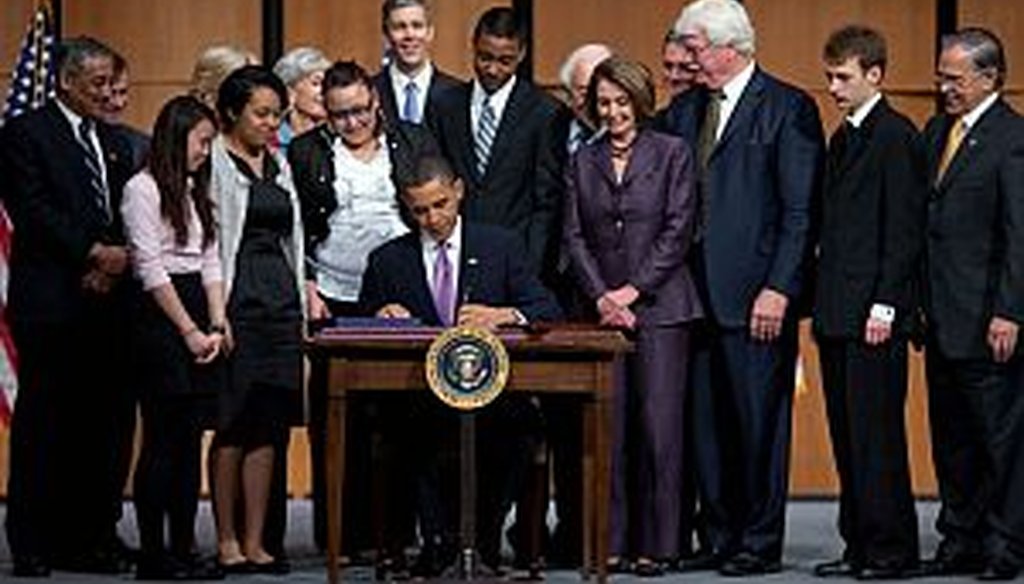Stand up for the facts!
Our only agenda is to publish the truth so you can be an informed participant in democracy.
We need your help.
I would like to contribute

President Barack Obama signed the Health Care and Education Reconciliation Act of 2010 into law.
We looked yesterday at the most significant falsehoods we’ve checked since President Barack Obama signed the health care law one year ago this week. Today, we wanted to focus on some of the other statements we’ve fact-checked during the past 12 months.
The truths
We fact-checked several statements during the past year that proved accurate, so we rated them true.
• Under the new health care law, "if a landscaper wants to buy a new lawnmower, or a restaurant needs a new ice-maker, they have to report that to the feds." Speaker of the House John Boehner, R-Ohio, is correct that the new law requires businesses to file Internal Revenue Service reports on expenditures above $600 to any single vendor. Democrats now agree that the requirement was poorly conceived and too complicated, and they say they’re willing to repeal it before it goes into effect in 2012. Congress hasn’t yet moved to change the rule. PolitiFact Ohio rated Boehner’s statement True.
• New provisions of the health care law bar the use of flexible spending accounts and health savings accounts to pay for aspirin and other non-prescription health needs. As of Jan. 1, 2011, these types of accounts no longer offered reimbursements for over-the-counter drugs without a prescription. However, those same items could be covered with a prescription. Tightening up the tax break on over-the-counter purchases will generate an estimated $5 billion in federal revenues through 2019. PolitiFact Virginia rated this statement, made by the state Republican Party chairman Pat Mullins, True.
• "With this reform, every insured American gets valuable consumer protections, and every uninsured American can become insured." The new health care law included many protections for consumers; you can read about the numerous provisions in our fact-check. Keeping in mind that "can" is not the same as "will," we found that starting in 2014, every American will be able to sign up for insurance. PolitiFact Texas rated the statement True.
• "Obama put a 10 percent tax on tanning." Reality TV star Snooki complained about the new tax on indoor tanning, and she’s not making it up. The new tax took effect July 1, 2010. We rated her statement True.
Sign up for PolitiFact texts
• Orrin Hatch (and other Republicans) co-sponsored a 1993 health care bill that had an individual mandate. Liberal pundit Cenk Uygur noted that Sen. Orrin Hatch, R-Utah, has said that an individual mandate in unconstitutional. But back in 1993, Uygur said, Hatch actually sponsored a health care bill that included an individual mandate. We checked the archives and found Uygur was right. Hatch did co-sponsor a plan with a requirement that everyone buy insurance. So did two other senators: Sen. Charles Grassley, R-Iowa, and Sen. Richard Lugar, R-Ind. We rated Uygur’s statement True.
The half-truths
Sometimes, though, people sometimes say things that are in the grey area: partly true, but partly misleading. For those, we have our rating of Half True. Here are the most significant Half True statements of the past year.
• The health care bill "cuts the deficit by over $1 trillion dollars." President Obama said this, and it presents a highly speculative number as a hard fact. The nonpartisan Congressional Budget Office said that the health care bill will lower the deficit over 20 years. But they also said there are uncertainties in the law that make it difficult to create detailed projections for just how much the deficit will be reduced. We rated Obama's statement Half True.
• The health care reform law pays for "6 years of benefits with 10 years of tax increases." It is true that the health care law includes new taxes that go into effect before some of the benefits start. Some of the taxes do kick in before some of the most costly provisions, but these only amount to 10 percent of the revenue raised by the bill. The new revenues and costs start to come into balance by the tenth year and are projected to reduce the deficit slightly in the years to follow. PolitiFact Virginia rated this statement from Rep. Eric Cantor, R-Va., as Half True.
• The majority of people in polls do "not support Obamacare." Opponents of the health care law often claim that polls show that most people don’t want it. Actually, when you look at it over the long term, the polls show the public is just about evenly split on the law, with the numbers shifting slightly from time to time or when the questions are phrased differently. O'Reilly isn't entirely wrong, in the sense that support for the bill does not hit 50 percent or higher. So we rated his statement Half True.
• "Under the clear letter of the law," Justice Clarence Thomas "must recuse himself" from the case challenging the constitutionality of the health care law. Rep. Anthony Weiner, D-N.Y., had made this case repeatedly. He has said that Thomas’s wife Virginia Thomas has worked for political groups that opposed the health care law. She has worked for them, but it’s not clear that requires her husband to recuse himself. A legitimate legal argument can be made that Thomas does not have to recuse himself. We reviewed the arguments and rated Weiner’s statement Half True.
• The federal government "may put 16,500 IRS agents in charge of policing President Obama's health care bill." It's fair to assume that the IRS will need to hire new employees, perhaps thousands, to handle the caseload from the new health care law. But Republican staffers who calculated the number acknowledged that 16,500 is the high end of a range that could theoretically stretch as low as 5,900 using their methodology. Rep. Michele Bachmann, R-Minn., made this statement and was careful to say "may" instead of "will." We rated it Half True.
Our Sources
See individual reports for complete sources.





















































